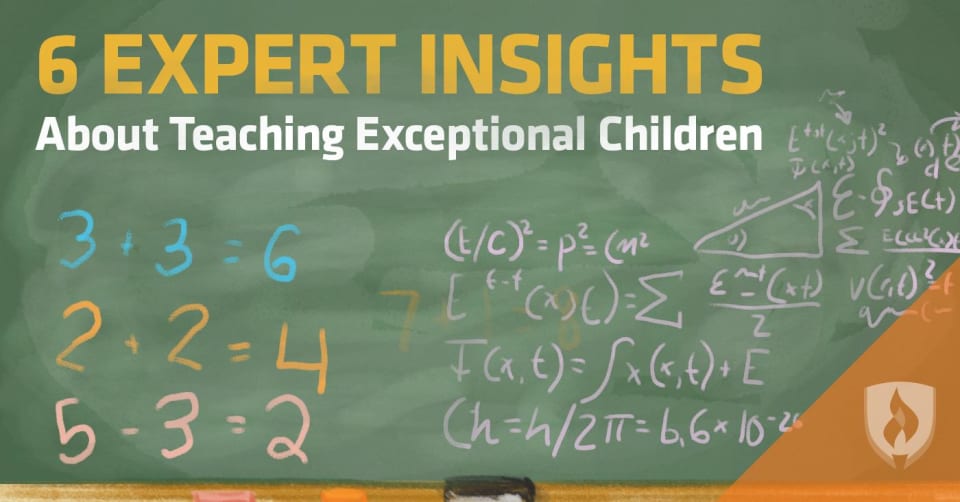6 Expert Insights About Teaching Exceptional Children
By Emily Hayden on 02/02/2017
If you were to randomly poll twenty people at the grocery store about their school experiences, it would probably result in twenty diverse responses. But how can a country that has made efforts to universalize education produce citizens who leave the system with various degrees of success?

The most challenging and important role of a teacher is to provide curriculum that results in preparing children to be successful in their world. With the diverse array of student abilities, it is almost certain that teachers will have an opportunity to work with multiple exceptional children each year.
Though the label “exceptional” encompasses an amazing range of individuals, it generally refers to students who benefit from modified curriculum due to their unique learning abilities. This results in exceptional students being either relatively behind or advanced when compared to the “norm” at various grade levels. Serving these students is challenging, but it can be one of the most rewarding experiences in a teacher’s career.
Do you think you have what it takes to teach exceptional children? We spoke with experts within the education sphere to learn their insights on this topic. Read on to discern if you’re cut out for this job.
6 things to remember when teaching exceptional children
1. All children are unique
“An exceptional child is like any other child in the sense that he or she has different strengths and weaknesses and learns through various combinations of the multiple intelligences,” says Amanda Selogie, a former educator who currently serves as an attorney for Selogie and Brett, LLP where she advocates for children and families with special needs. “Even as adults, we have different things we are good at and things we need.”
As a parent, you are well aware of your child’s unique personality, regardless of whether or not they have been labeled as “exceptional.” The very first step in successfully working with a child—exceptional or otherwise—is to figure out who they are as individuals.
2. Creativity is essential
“People who work with exceptional children need to be flexible and to think out of the box,” suggests Janet Ruth Heller, a veteran college professor of 35 years who has worked primarily with gifted students. She emphasizes that gifted children will often become bored with both the content and rigor of a regular curriculum.
With this in mind, it is the teacher’s job to figure out a way to modify the curriculum in a way that is both exciting and differentiated. Taking risks with new methods and being willing to use your imagination are crucial to connecting with exceptional children.
3. Assumptions are dangerous
“One of the worst mistakes that teachers make is deciding that kids with behaviors are bad kids; that they will always be bad kids and that these behaviors are not changeable,” asserts Vickie Brett, another attorney who practices at Selogie and Brett, LLP where she partners with Selogie in advocating for exceptional children.
It is not uncommon that teachers will witness exceptional children acting out, throwing tantrums, talking back and disengaging from many parts of the curriculum. These observations can lead to dangerous assumptions about the child’s inherent inability to learn or even be misconstrued as innate character flaws.
What teachers perceive as negative behaviors is often an exceptional child’s way of expressing boredom. The student may have a surplus of extra energy needing to be released simply by taking a quick walk around the classroom. It could also be true that the teacher is not catering to this specific student’s needs for learning, resulting in confusion and frustration.
Successful teachers take time to discern the origin of these behaviors, and they connect with what a specific exceptional child needs.
4. Exceptional children have loved ones
As a parent, you understand and love your child better than any teacher, relative or friend. You have unique insights about his or her personality, values, favorite activities and constantly changing emotions.
In a similar vein, teachers connect best with the exceptional children in their classrooms when they collaborate with these individuals’ parents or guardians. When a child struggles to articulate what they need in the classroom, these primary caregivers might be able to offer some advice.
From her legal perspective, Brett has found that even though exceptional children are her clients, the most progress results from partnering with caregivers, as they are often the best experts on their children and their greatest advocates.
5. Be willing to learn from mistakes and successes
As creatures of habit, we tend to go on autopilot while performing our daily routines. “We get fixated on one thing when it comes to working with exceptional children. If a certain technique works with one kid, we automatically think it will work with the next kid,” Selogie observes about her work with exceptional children.
When you work with exceptional children, you are going to experience multiple failures and successes with each individual. Although it is very important to celebrate the successes you have with a specific student, it is equally important to maintain a mindset of continual growth when your ideas don’t result in achievement with the next student. Find joy in the fact that all exceptional children have diverse needs, and your variety of attempts to meet them is essential to your success as an educator.
6. Beware of labels and generalizations
“Though I wish I had more knowledge about how to diagnose certain syndromes such as different spectrums of autism, ADHD and others, I have also seen people be too quick to label a student and thus fail to see their potential,” explains Wendy Dartnall, an education professional who has spent years working with young ESL students and vision-impaired adults.
While it cannot be denied that a child’s special education diagnosis provides beneficial information and a basic place to begin providing the best learning environment, teachers need to remember that exceptional students are unique even within the umbrellas of their given label.
It’s important to show a genuine interest in connecting with the child as an individual instead of by a label. You will discover ways to meet their unique needs that a label or diagnosis could have never revealed.
Are you ready for the joys and challenges of teaching exceptional children?
After reading what the experts say about teaching exceptional children, you might be surprised to realize your experiences have already begun to develop the traits of a successful teacher. After all, your own children are unique, and you adapt and grow daily in your attempts to meet their needs. Why not consider turning this into a career?
Can introverts be teachers too? Explore our article, Why Introverted Teachers have an Edge to learn how your unique traits can be valuable assets in the teaching profession.
To learn more about what is involved in working with exceptional children, check out this article: 9 Things You Need to Know Before Working with Special Needs Students.
RELATED ARTICLES:




